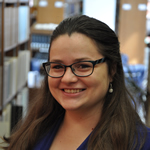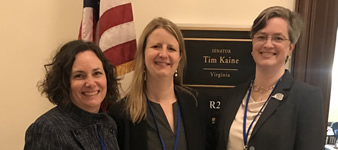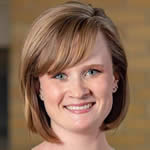 Meng Qu is a Web Service Librarian in Miami University (Oxford, Ohio) since October 2018. She gained her M.A. in Library and Information Studies from University of Wisconsin, Madison in 2018. As a computer-technology fanatic, Meng keeps sharpening her skills on website UI & UX development and assisting with data analyzation and data visualization in her daily work. In a recent project to build a new university library’s website, she took the lead in designing the appearance of the website and conducted usability research. Meng’s research interests are website design and development, data analyzation and visualization, and GIS/indoor navigation pathfinding systems.
Meng Qu is a Web Service Librarian in Miami University (Oxford, Ohio) since October 2018. She gained her M.A. in Library and Information Studies from University of Wisconsin, Madison in 2018. As a computer-technology fanatic, Meng keeps sharpening her skills on website UI & UX development and assisting with data analyzation and data visualization in her daily work. In a recent project to build a new university library’s website, she took the lead in designing the appearance of the website and conducted usability research. Meng’s research interests are website design and development, data analyzation and visualization, and GIS/indoor navigation pathfinding systems.The intention of collecting user data is simple: the website developers want to have better understanding of our users, in a more objective way; and to adjust the elements in presenting a more attractive, convenient, and human-friendly website. User Experience (UX) is the professional and concise term to express such process.
In this research, a large range of user behavior data have been collected, such as user stickiness, user activities, user events, page traffic, events flow, just name a few. Through the dataset, the developers were able to tell the preferences and trends from users, and to make adjustments. For example, we have noticed an increasing view on the Special Collections webpage during an event of that department. To provide faster access, we chose the top five items and placed them on the library website homepage, which lead to a faster growth of page views on Special Collections. Such decisions rely on large data collections and dataset analyzations, and result to better user experiences.
An other benefit of applying data analyzation mechanism on library UX development is that, realizing the trend in our user and adapt with the trend. For instance, our data shown there is an increasing raise of mobile and tablet usage among the users in the recent 12 month. Then we have realized the responsive design of the website needs adjustments to fit on that special needs. Not only the size and resolutions have been adjusted, but the layouts and functions have been optimized: for instance, we put more functions on the bottom 1/3 of the screen in mobile resolutions because of the different using habits between mobile and desktop users. Rely on data analyzation, we website developers could accurately tell what the users need, and how they approached to their goals. It is a benefit of online services and a new trend in the library field.
 Rebecca B. French is the Metadata Analyst Librarian at James Madison University, where she develops workflows and tools for efficiently creating, manipulating, transforming, and analyzing metadata at scale. Her work spans traditional MARC cataloging, e-resource batch loading, and metadata for archival and digital collections. Rebecca was previously a music cataloger at James Madison University and at Indiana University’s William and Gayle Cook Music Library. She holds a BA from The College of William and Mary and an MLS with a specialization in music librarianship from Indiana University.
Rebecca B. French is the Metadata Analyst Librarian at James Madison University, where she develops workflows and tools for efficiently creating, manipulating, transforming, and analyzing metadata at scale. Her work spans traditional MARC cataloging, e-resource batch loading, and metadata for archival and digital collections. Rebecca was previously a music cataloger at James Madison University and at Indiana University’s William and Gayle Cook Music Library. She holds a BA from The College of William and Mary and an MLS with a specialization in music librarianship from Indiana University. Christopher Stewart is the Discovery and Metadata Coordinator at Ottenheimer Library at the University of Arkansas at Little Rock. His research interest is in discovering and developing unrecognized resources for data driven decisions in libraries.
Christopher Stewart is the Discovery and Metadata Coordinator at Ottenheimer Library at the University of Arkansas at Little Rock. His research interest is in discovering and developing unrecognized resources for data driven decisions in libraries.
 Laura Birkenhauer is the Student Success Librarian for Campus Engagement for the Miami University Libraries in Oxford, OH.
Laura Birkenhauer is the Student Success Librarian for Campus Engagement for the Miami University Libraries in Oxford, OH. Shelly Hypes is the Director of Access Services at The University of North Carolina at Charlotte. At J. Murrey Atkins Library, Shelly works with her colleagues to develop thoughtful and innovative ways to connect the campus community with library collections and services. With professional experience in public and academic libraries, Shelly enjoys work allowing her to focus on the management of projects, systems, and change, applying for and managing grant funds, and library branding and design. Shelly is a Certified Ex Libris Alma Administrator and has been awarded the Virginia Public Library Directors Association Award for Outstanding Service for her introduction of ten Little Free Libraries to the city of Danville, Virginia.
Shelly Hypes is the Director of Access Services at The University of North Carolina at Charlotte. At J. Murrey Atkins Library, Shelly works with her colleagues to develop thoughtful and innovative ways to connect the campus community with library collections and services. With professional experience in public and academic libraries, Shelly enjoys work allowing her to focus on the management of projects, systems, and change, applying for and managing grant funds, and library branding and design. Shelly is a Certified Ex Libris Alma Administrator and has been awarded the Virginia Public Library Directors Association Award for Outstanding Service for her introduction of ten Little Free Libraries to the city of Danville, Virginia.
 Megan Wilson is an Assistant Professor and Research & Instruction Librarian at Murray State University. She currently serves as the liaison to the College of Science, Engineering and Technology as well as the School of Agriculture. Having taught and worked with courses in person and online using a variety of formats, her research interests include virtual reference, library outreach and online learning.
Megan Wilson is an Assistant Professor and Research & Instruction Librarian at Murray State University. She currently serves as the liaison to the College of Science, Engineering and Technology as well as the School of Agriculture. Having taught and worked with courses in person and online using a variety of formats, her research interests include virtual reference, library outreach and online learning.  Yukari Sugiyama is the Librarian for Discovery and Metadata Assessment at Yale University Library. She plays a key role in the areas of resource discovery and metadata management and performs analysis, remediation, and normalization of metadata in the library’s online catalogs and discovery layer. In ALA, she currently serves on ALCTS Cataloging and Classification Research Interest Group as vice co-chair and ALCTS Continuing Education Committee as ex-officio member.
Yukari Sugiyama is the Librarian for Discovery and Metadata Assessment at Yale University Library. She plays a key role in the areas of resource discovery and metadata management and performs analysis, remediation, and normalization of metadata in the library’s online catalogs and discovery layer. In ALA, she currently serves on ALCTS Cataloging and Classification Research Interest Group as vice co-chair and ALCTS Continuing Education Committee as ex-officio member. Hyun Chu Kim, Interim Director of Technical Services, Kennesaw State University
Hyun Chu Kim, Interim Director of Technical Services, Kennesaw State University Ariel Turner, Department Chair, Kennesaw State University
Ariel Turner, Department Chair, Kennesaw State University
 Meranda Roy, is an Online Learning Librarian at the University of North Texas. Previously, she was the Faculty Development Specialist at the University of North Texas where she taught several graduate courses and numerous workshops for instructors related to pedagogy. In those courses and workshops, she tired various techniques to encourage the development of communities of practice. Her professional interests include teaching, educational technology, academic development, training and development, human resources, and mentoring.
Meranda Roy, is an Online Learning Librarian at the University of North Texas. Previously, she was the Faculty Development Specialist at the University of North Texas where she taught several graduate courses and numerous workshops for instructors related to pedagogy. In those courses and workshops, she tired various techniques to encourage the development of communities of practice. Her professional interests include teaching, educational technology, academic development, training and development, human resources, and mentoring.